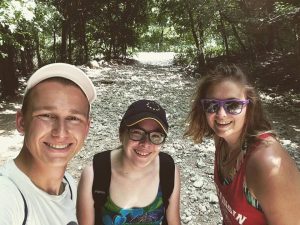I’ve been working at Water to Thrive for over a month now, and the time has flown by. My main project is a marketing plan that W2T can use to reach out to their Christian audience. Although W2T is a faith-based organization with roots in a Lutheran church, they don’t currently have any marketing strategies to reach one of their biggest donor bases – churches. That’s where I come in.
Like with any project I’ve done for school, I started with research. This included looking up Christian publications, nearby churches, and best practices for nonprofit marketing. I also needed to know everything I could about Water to Thrive, an organization I had never heard of before I worked here. I also had to go through all their currently marketing, especially social media and print collateral to see how I could tweak it to appeal to a Christian audience. My favorite part has been creating sample social media posts, when I get to channel my creativity and minimal graphic design skills.
I’ve learned that creating a marketing plan is a really good way to get to know an organization. I’ve had to include statistics, such as how W2T has funded over 750 wells since 2008, which have affected over 400,000 people. I’ve looked at their recent campaigns, which have come from churches, universities, and weddings. I’ve poured over their annual progress reports and learned about how the organization has touched lives on both sides of the Atlantic.
The motto of W2T is “Build Wells, Change Lives.” As I work, I’m constantly amazed at how deeply lives are actually changed. Clean and accessible water is something that we constantly take for granted. We can have it everywhere – in our houses, in our schools, in our churches, in almost every building in the country. But that’s obviously not the case in rural Africa. Women and children walk for miles to get water, which is often dirty and contaminated. But a single accessible well can flip their lives upside down. The children can go to school because they don’t have to spend hours walking for water. Women have more time to care for their family and cook better meals. There is less disease from waterborne bacteria. The well becomes a place of communal pride for the whole village. While some in developing countries may believe that drinking water is just a “fad”, for many around the world, water is life.
But the lives being changed don’t stop in the African villages. Here in the States, people are continuously being affected by the work of W2T. Wells are funded through campaigns, where a group or individual raises $5,000 to sponsor a well. There have been campaigns by churches, university groups, elementary schools, even couples sponsoring wells in lieu of receiving wedding gifts. In the grand scheme of things, $5,000 isn’t that much to change the lives of hundreds of people. I love that there are people here that are so willing to donate just a few dollars to a campaign in order to change the lives of Ethiopian villagers halfway around the world. They’re willing to host small fundraisers, attend W2T’s annual events, and educate others about the African water crisis. The dedication of W2T supporters around the country is unbelievable and it inspires me to do all I can to spread the message of this organization. Although my work isn’t immediately affecting anyone in Africa, I can do my best to make sure that it does influence churches, who can take the steps to launch their own well-building campaign and change lives.
As someone who was born and raised in the Midwest, life in Texas was certainly an adjustment. I studied abroad in England last semester, yet I experienced more culture shock during my first few days here than months in Europe. The most obvious difference is the heat. The locals laughed when I complained when it was in the mid-90s. They said it would just get hotter. And it sure has, much to my chagrin. There’s prickly pear cacti and aloe plants along the street and in front yards. And people do actually say “y’all” all the time. But besides the heat and birds that occasionally try to attack me (grackles are the worst), Austin is a really fun city. There’s always something to do, whether it’s hiking, live music, free movies, taco festivals, exploring museums, or hanging out with former W2T CAPS Fellows (shout-out to Lars and Krista). And I could write a whole other blog post about how great the food is here. But I’ll save that for another time.


Great thoughts. Louisa.